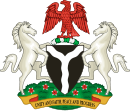| This article is part of a series in |
| Culture of Nigeria |
|---|
 |
The Third Generation of Nigeria Writers is an emerging phase of Nigerian literature, in which there is a major shift in both the method of publishing and the themes explored.[1][2] This set of writers are known for writing post-independence novels and poems.[a][3] This generation is believed to be influenced by the western world,[5] politics[6] and the preceding generation of Mbari Club writers,[7] Flora Nwapa and Buchi Emecheta.[8] The emergence of the third generation of Nigerian writers has changed the publishing sector with a resurgence of new publishing firms such as Kachifo Limited, Parrésia Publishers, Cassava Republic Press and Farafina Books.[9][10] These new writers create new genres and methods that deal with racism, class, abuse and violence.[11][12]
- ^ a b Amadi, Osa (7 November 2021). "Nigerian writers should 'bomb' criminals with words – Prof Adimora-Ezeigbo". Vanguard. Retrieved 29 March 2022.
- ^ Online, Tribune (26 March 2022). "A New Generation Of Nigerian Writers: Who Are They?". Nigerian Tribune. Retrieved 29 March 2022.
- ^ a b Coker, Oluwole (23 April 2017). "Theorising third-generation Nigerian novels". The Guardian. Retrieved 25 September 2021.
- ^ The Poetics and Politics of 21st Century Nigerian Writing. ProQuest LLC. 2014. p. 350.
- ^ Coffey, Meredith Armstrong (25 May 2016). Narrow nationalisms and third generation Nigerian fiction (Thesis). doi:10.15781/T2X63B60G. Retrieved 6 October 2021 – via University of Texas Libraries.
- ^ Egya, Sule E. (July 2012). "Historicity, power, dissidence: The third-generation poetry and military oppression in Nigeria". African Affairs. 444 (111): 424–441. doi:10.1093/afraf/ads025 – via Oxford Academic.
- ^ Courtois, Cédric (1 April 2018). ""In this Country, the Very Air We Breathe Is Politics": Helon Habila and the Flowing Together of Politics and Poetics". Commonwealth Essays and Studies. 40 (2): 55–68. doi:10.4000/ces.289. S2CID 216894122 – via OpenEdition.org.
- ^ Nadaswaran, Shalini (2011). "Rethinking Family Relationships In Third-Generation Nigerian Women's Fiction". Relief. 5 (1). Igitur Publishing: 19–32. doi:10.18352/relief.652. ISSN 1873-5045.
- ^ Shercliff, Emma (9 December 2015). "The changing face of Nigerian literature". British Council. Retrieved 8 October 2021.
- ^ Bookshy (2012). "52 Years of Nigerian Literature: The Third Generation". BookShy. Retrieved 8 October 2021.
- ^ Features, BellaNaija (1 January 2018). "10 Contemporary Nigerian Writers To Look Out For in 2018". BellaNaija.
- ^ Alter, Alexandra (23 November 2017). "A Wave of New Fiction From Nigeria, as Young Writers Experiment With New Genres". New York Times.
Cite error: There are <ref group=lower-alpha> tags or {{efn}} templates on this page, but the references will not show without a {{reflist|group=lower-alpha}} template or {{notelist}} template (see the help page).
